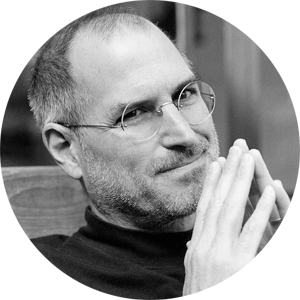Topics: Life Before Apple | How He Saw Himself | Building Apple | Macintosh Memories | Returning to Apple | Leadership Style | The Apple Difference | Apple Products | Design | Creativity & Innovation | Technology | Recruiting | Microsoft | Other Companies | Money | Philosophy & Beliefs | Predicting the Future | Personal Stuff | Death | Lessons Learned
 Steve Jobs Quotes: Other Companies
Steve Jobs Quotes: Other Companies
With many things — high-performance automobiles, for example — the aesthetic comes right from the function, and I suppose electronics is no different. But I’ve also found that the best companies pay attention to aesthetics. They take the extra time to lay out grids and proportion things appropriately, and it seems to pay off for them. I mean, beyond the functional benefits, the aesthetic communicates something about how they think of themselves, their sense of discipline in engineering, how they run their company, stuff like that.
When these [start-ups] sell out, even though they get fabulously rich, they’re gipping themselves out of one of the potentially most rewarding experiences of their unfolding lives. Without it, they may never know their values or how to keep their new-found wealth in perspective.
Japan’s [tech companies are] very interesting. Some people think it copies things. I don’t think that anymore. I think what they do is reinvent things. They will get something that’s already been invented and study it until they thoroughly understand it. In some cases, they understand it better than the original inventor.
Throughout the years in business, I found something. I always ask why you do things. The answers you invariably get is, “That’s just the way it’s done.” Nobody knows why they do what they do. Nobody thinks about things very deeply in business, that’s what I found.
It’s hard to tell with these Internet startups if they’re really interested in building companies or if they’re just interested in the money. I can tell you, though: If they don’t really want to build a company, they won’t luck into it. That’s because it’s so hard that if you don’t have a passion, you’ll give up.
Pretty much, Apple and Dell are the only ones in this industry making money. They make it by being Wal-Mart. We make it by innovation. [2002]
With our technology, with objects, literally three people in a garage can blow away what 200 people at Microsoft can do. Literally can blow it away. Corporate America has a need that is so huge and can save them so much money, or make them so much money, or cost them so much money if they miss it, that they are going to fuel the object revolution.
We think Android is very, very fragmented, and becoming more fragmented by the day. And as you know, Apple strives for the integrated model so that the user isn’t forced to be the systems integrator.
The subscription model of buying music is bankrupt. I think you could make available the Second Coming in a subscription model and it might not be successful.
I hate it when people call themselves “entrepreneurs” when what they’re really trying to do is launch a startup and then sell or go public, so they can cash in and move on.
I will spend my last dying breath if I need to, and I will spend every penny of Apple’s $40 billion in the bank, to right this wrong. I’m going to destroy Android, because it’s a stolen product. I’m willing to go to thermonuclear war on this. [Jobs famously believed that Google stole Apple’s ideas for mobile computing when they created Android]
We put iTunes on Windows in order to sell more iPods. But I don’t see an advantage of putting our music app on Android, except to make Android users happy. And I don’t want to make Android users happy.
CEOs are supposed to have class. I can see that isn’t an opinion you hold. [In a 1997 letter written to Michael Dell after Dell said publicly that Apple should close its doors and return investment dollars to shareholders]
You’re blowing it with Fox News. The axis today is not liberal and conservative, the axis is constructive-destructive, and you’ve cast your lot with the destructive people. Fox has become an incredibly destructive force in our society. You can be better, and this is going to be your legacy if you’re not careful. [To Rupert Murdoch, owner and/or chairman of Fox News, 20th Century Fox, News Corp., & much more]
Even though some people have come out with neat products, if their company is perceived as a sweatshop or a revolving door, it’s not considered much of a success. Remember, the role models were Hewlett and Packard. Their main achievement was that they built a company. Nobody remembers their first frequency counter, their first audio oscillator, their first this or that. And they sell so many products now that no one person really symbolizes the company… And they built a company and they lived that philosophy for 35 or 40 years and that’s why they’re heroes. Hewlett and Packard started what became the [Silicon] Valley.
Companies, as they grow to become multibillion-dollar entities, somehow lose their vision. They insert lots of layers of middle management between the people running the company and the people doing the work. They no longer have an inherent feel or a passion about the products. The creative people, who are the ones who care passionately, have to persuade five layers of management to do what they know is the right thing to do.
People get confused; companies get confused. When they start getting bigger, they want to replicate their initial success. And a lot of them think, “Well, somehow, there’s some magic in the process of how that success was created.” So they start to institutionalize process across the company. And before very long, people start to get confused that the process is the content. And that’s ultimately the downfall of IBM. IBM has the best process people in the world. They just forgot about the content. And that happened a little bit at Apple, too. We had a lot of people who were great at management process. They just didn’t have a clue about the content. In my career, I found that the best people are the ones that really understand the content. And they’re a pain in the butt to manage! But you put up with it because they’re so great at the content. And that’s what makes great products. It’s not process, it’s content.
The technology crashed and burned at Xerox. Why? I learned more about this with John Sculley later on. What happens is, John came from Pepsico. And they — at most — would change their product once every 10 years. To them, a new product was a new sized bottle. So if you were a “product person,” you couldn’t change the course of that company very much. So, who influences the success at Pepsico? The sales and marketing people. Therefore they were the ones that got promoted, and they were the ones that ran the company. Well, for PepsiCo that might have been okay, but it turns out the same thing can happen at technology companies that get monopolies. Like IBM and Xerox. If you are a “product person” at IBM or Xerox, you make a better copier or better computer. So what? When you have a monopoly market-share, the company’s not any more successful. So the people who make the company more successful are the sales and marketing people, and they end up running the companies. And the “product people” get run out of the decision-making forums. The companies forget how to make great products. The product sensibility and product genius that brought them to this monopolistic position gets rotted out by people running these companies who have no conception of a good product versus a bad product. They have no conception of the craftsmanship that’s required to take a good idea and turn it into a good product. And they really have no feeling in their hearts about wanting to help the customers.
I think the same philosophy that drives the product has to drive everything else if you want to have a great company. Manufacturing, for example… demands just as much thought and strategy as the product. If you don’t pay attention to your manufacturing, it will limit the kind of product you can build and engineer. Some companies view manufacturing as a necessary evil, and some view it as something more neutral. But we view it instead as a tremendous opportunity to gain a competitive advantage. [I’ve thought that] ever since I visited Japan in the early ’80s. And let me add that the same is true of sales and marketing. You need a sales and marketing organization that is oriented toward educating customers rather than just taking orders, providing a real service rather than moving boxes. This is extremely important.





